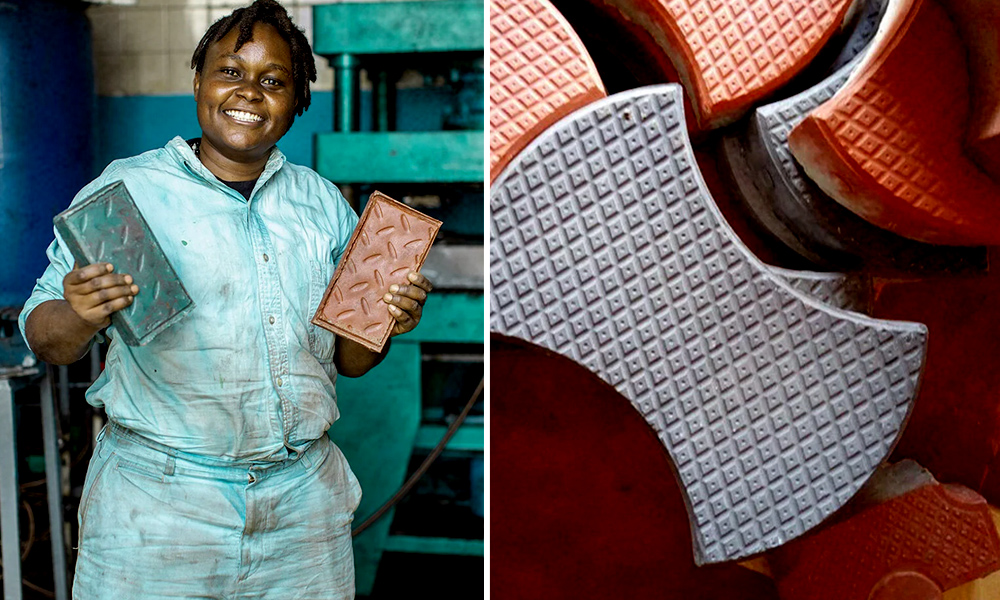
Image Credits: Designboom
Others/World
'Seven Times Stronger than Concrete': Kenyan Entrepreneur Builds Footpath Using Bricks Made Out of Recycled Plastic
 |
|29-year-old Nzambi Matee, who hails from Kenya's Nairobi, is a social and sustainability entrepreneur who has founded a start-up that turns plastic waste into bricks that are claimed to be stronger than concrete.
29-year-old Nzambi Matee, who hails from Kenya's Nairobi, is a social and sustainability entrepreneur who has founded a start-up that turns plastic waste into bricks that are claimed to be stronger than concrete.
According to Good News Network, Nzambi founded Gjenge Makers after she was "tired of being on the sidelines" while the government struggled with the massive amount of plastic waste in the country's capital city. Reports have mentioned that the material engineer took it upon herself to develop a construction product that was created out of waste and was five to seven times stronger than concrete.
"It is absurd that we still have this problem of providing decent shelter – a basic human need,' said Nzambi.
She further added that plastic is a material that has been misused and misunderstood for a long time now. The material has enormous potential and if not properly utilized, its afterlife can be disastrous.
Sustainable Solution
"The product is almost five to seven times stronger than the concrete and this is because of the basic material structure of the brick. It is made up of recycled plastic. Plastic is fibrous in nature and therefore the brick ends up having stronger compression strength. We make use of the waste that cannot be processed anymore," the entrepreneur told Reuters in a video interview.
Reports state that the waste includes high-density polythene which is used in milk and shampoo bottles. She also makes use of low-density polythene which are used in bags for cereals or sandwiches and polypropylene used for ropes and buckets. However, her factory does not work with polythene terephthalate or PET used majorly for plastic bottles.
Plastic waste is mixed with sand, heated and then compressed into bricks. Set up in 2017, Nzambi's factory currently produces 1,500 bricks each day. She gets the waste for free from packaging factories but she also buys the raw material from other recyclers.
"I was tired of being on the sidelines. You are waiting for someone to solve the plastic problem. Why do we need to wait for the government or the municipality or someone else other than you? Also, companies have to pay to dispose of the waste and we solved their problems. That was the first driver for working towards developing an alternative. Another was, maybe sheer curiosity. I could see it was happening in other parts of the world and knew it could be replicated in Kenya," Nzambi explained.
Describing the challenges, she said that developing one paver was doable, however, scaling up seemed a challenge. They were able to create one brick and if the idea had to hit the market, they had to work on mass-producing the bricks.
"After figuring out how to make one brick, the next step was to make a thousand. To make a thousand, we needed machines," she said.
Nzambi designed her own machines and is preparing to scale up and expand production up to 4,500 bricks in a day thereby recycling up to 60 tonnes of plastic a year. The brick is also half the weight and hence ends up saving an enormous amount of cost on transportation and installation.
The young entrepreneur for her sustainable innovation also bagged the 'Young Champion of The Earth 2020 Africa' Award.
" Now we are just making the paving blocks but soon we also want to make actual building blocks. You have to be true to your why. Why are you doing this? What is the motivation behind it? So Act— Act For Nature," exclaimed the environment enthusiast.
Plastic Pollution
According to National Geographic, the production of plastic, globally, increased from 2.3 million tons in 1950 to 448 million tons by 2015. The production is expected to double by 2050. It also stated that half of all plastics ever manufactured have been made in the last 15 years and most of them could have ended up as pollutants entering our natural environment and oceans.
Every year, about eight million tons of plastic waste escapes into the oceans from coastal nations which is the equivalent of setting five garbage bags full of trash on every foot of coastline around the world.
Also Read: Sonam Wangchuk Gifts 'Solar Heated Tent' To Indian Jawans Braving Extreme Cold In Galwan Valley